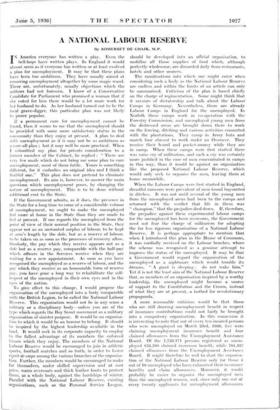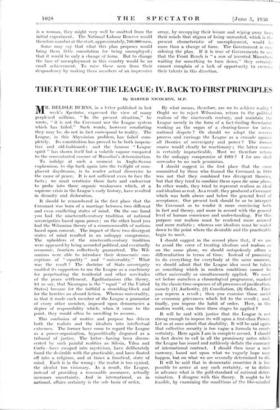A NATIONAL LABOUR RESERVE
By SOMERSET DE CHAIR, M.P.
IN America everyone has written a play. Even the bell-hops have written plays. In England it would almost seem as if everyone has written or at least evolved a plan for unemployment. It may be that these plans have been too ambitious. They have usually aimed at removing unemployment altogether by some magic wand. There are, unfortunately, usually objections which the authors had not foreseen. I know of a Conservative Candidate for Parliament who promised a woman that if she voted for him there would be a lot More work for lar husband to do. As her husband turned out to be the local grave-digger, this particular plan was not likely to prove popular.
If a permanent cure for unemployment cannot be found, then it seems to me that the unemployed should be provided with some more satisfactory status in the community than they enjoy at present. A plan to deal with unemployment as it is may not be so ambitious as a cure-all plan ; but it may well be more practical. When I submitted my plan for private consideration to a former member of the Cabinet, he replied : "There are very few mails which do not bring me some plan to cure unemployment, most of them futile. Yours is something different, for it embodies an original idea and I think a fruitful one." This plan does not pretend to eliminate unemployment. Its aim is, however, to answer the main questions which unemployment poses, by changing the nature of unemployment. This is to be done without additional cost to the State.
If the Government admits, as it does, the presence in the State for a long time to come of a considerable volume of unemployment, we ought to make the unemployed feel more at home in the State than they are made to feel at present. If one regards the unemployed from the point of view of their normal position in the State, they appear not as an unwanted surplus of labour, to be kept at arm's length by the dole, but as a reserve of labour, to he taken on as soon as the processes of recovery allow. Similarly, the pay which they receive appears not as a dole but as a reserve pay, comparable with the half-pay which officers in the Services receive when they are waiting for a new appointment. As soon as you have recognised the unemployed as a reserve of labour, and the pay which they receive as an honourable form of reserve pay, you have gone a long way to rehabilitate the self- respect of the unemployed in their own eyes and in the eyes of the nation.
To give effect to this change, I would propose the organisation of the unemployed into a body comparable with the British Legion, to be called the National Labour Reserve. This organisation would not be in any sense a military or a disciplinary body—unless you are of the type which regards the Boy Scout movement as a military organisation of sinister purpose. It would be an organisa- tion to which it would be an honour to belong. It should be inspired by the highest leadership available in the land. It would seek in its corporate capacity to employ to the fullest advantage of its members the enforced leisure which they enjoy. The members of the National Labour Reserve would be encouraged to join in athletic sports, football matches and so forth, in order to foster esprit de corps among the various branches of the organisa- tion. Further, the members would be encouraged to make for themselves, under skilled supervision and at cost price, warm overcoats and thick leather boots to protect them, as a whole 'body, against the hardships of winter. Parallel .ivith the National Labour Reserve, existing organisations, such as the 'Personal Service League, should be developed into an official organisation. to mobilise all those supplies of food which, although perfectly wholesome, are discarded daily from restaurants, hotels and other sources.
The ramifications into which one might enter when considering such a body as the National Labour Reserve are endless and within the limits of an article can only be summarised. Criticism of the plan is based chiefly on the charge of regimentation. Sonic might think that it savours of dictatorship and talk about the Labour Camps in Germany. Nevertheless, there are already Labour Camps in England for the unemployed. In Norfolk these camps work in co-operation with the Forestry Comniission, and unemployed young men from the distressed areas are brought down there to work on the fencing, ditching and various activities connected with the plantations. They camp in Army huts and march four abreast to work under an Overseer. They receive their board and pocket-money while they are in camp. When these camps were first started there was some cry of militarism, and such a cry was certainly more justified in the case of men concentrated in camps in this way, than it would be against an organisation like the proposed National Labour Reserve, which would only seek to organise the men, leaving them at home meanwhile.
When the Labour Camps were first started in England, dreadful rumours were prevalent of men found bayoneted in ditches. It was not until several of the young men from the unemployed areas had been to the camps and returned with the verdict that life in them was "champion," that the prejudice died down. If, therefore, the prejudice against these experimental labour camps for the unemployed has been overcome, the Government need not fear the charge of militarism for adopting the far less rigorous organisation of a National Labour Reserve. It is perhaps appropriate to mention that when I introduced this plan in the House of Commons, it was cordially received on the Labour benches, where the scheme was recognised as a genuine attempt to improve the status of the unemployed. It may be that a Government would regard the organisation of the unemployed as a nightmare which would trouble its dreams. "A giant is sleeping; do not wake him." Yet it is not the least aim of the National Labour Reserve that, as members of an organisation inspired by a worthy leadership, the unemployed might become a source of support to the Constitution and the Crown, instead of what they are at present, a hotbed for revolutionary propaganda.
A more reasonable criticism would be that those who are still drawing unemployment benefit in respect of insurance contributions could not fairly be brought into a compulsory organisation. In this connexion it is interesting to note that out of every ten insured persons who were unemployed on March 23rd, 1936, five were claiming unemployment insurance benefit and four claimed allowances from the Unemployment Assistance Board. Of the 1,733,171 persons registered as unem- ployed 8512,580 claimed insurance benefit, while 701,437 claimed allowances from the Unemployment Assistance Board. It aught therefore be well to start the organisa- tion of the National Labour Reserve only for those 4 out of 10 unemployed who have exhausted their insurance benefits and Claim allowances. Moreover, it would probably be easier to organise the unemployed men than the unemployed women, and, since only one out of every twenty applicants for unemployment allowances is a woman, they might very well be omitted from the initial experiment. The National Labour Reserve would therefore number at the start, approximately, 700,000 men.
Some may say that what this plan proposes would bring them little consolation for being Unemployed ; that it would be only a change of form. But to change the face of unemployment in this country would be no small achievement. To raise these men from their despondency by making them members of an impressive array, by occupying their leisure and wiping away from their minds that stigma of being unwanted, which is the present characteristic of unemployment, would be more than a. change of form. The Government is con- sidering the plan. If it is true of Governments to say that the Front Bench is " a row of inverted Micawbers waiting for something to turn down," they certainly cannot complain of a lack of opportunity to exfa.cise their talents in this direction.















































 Previous page
Previous page